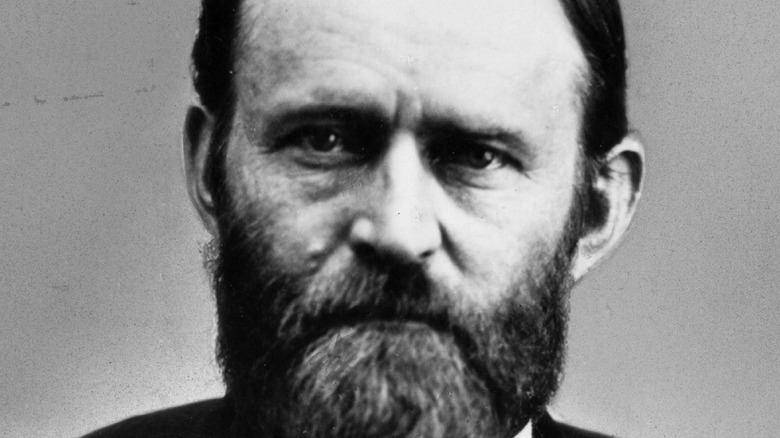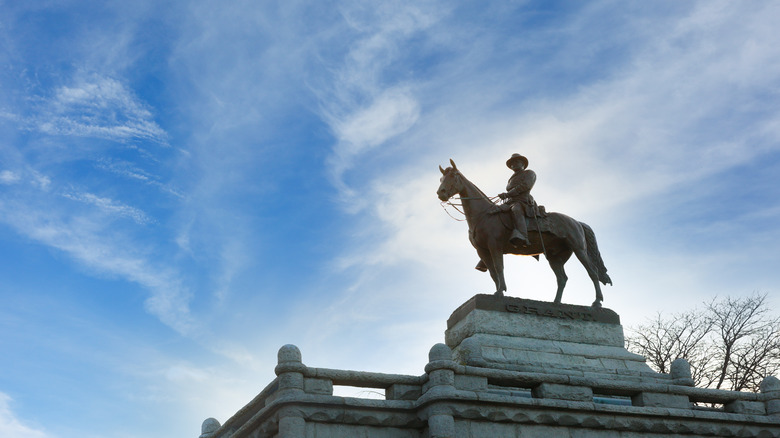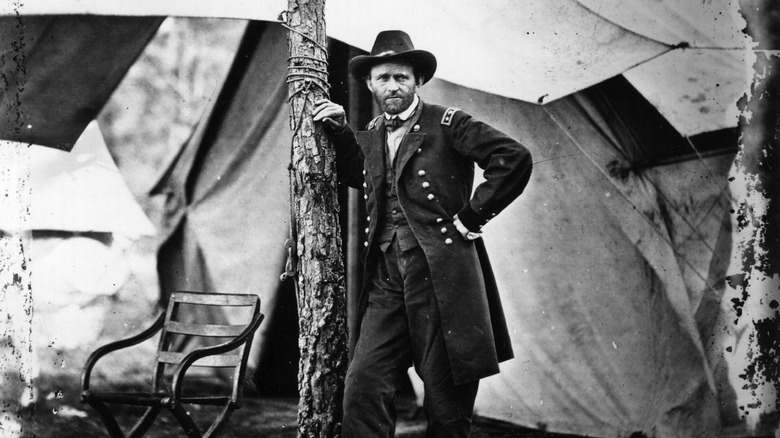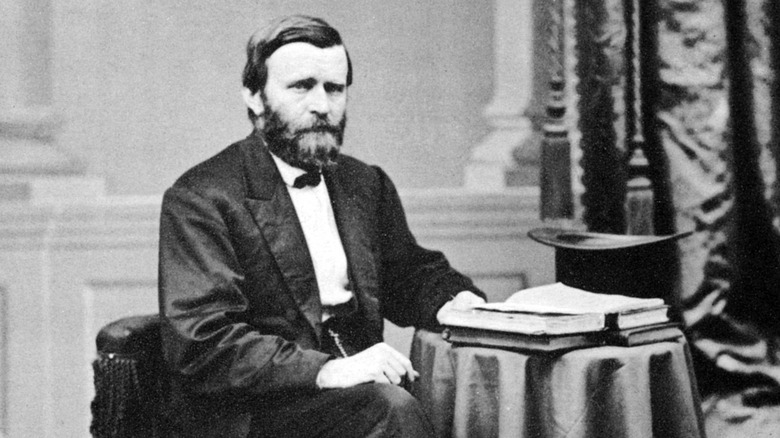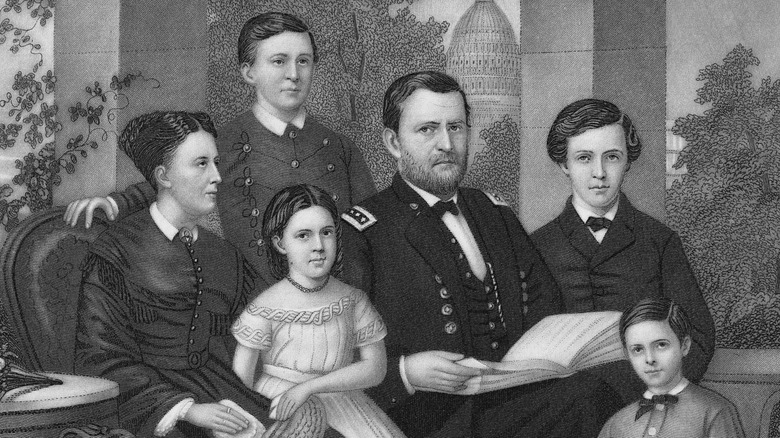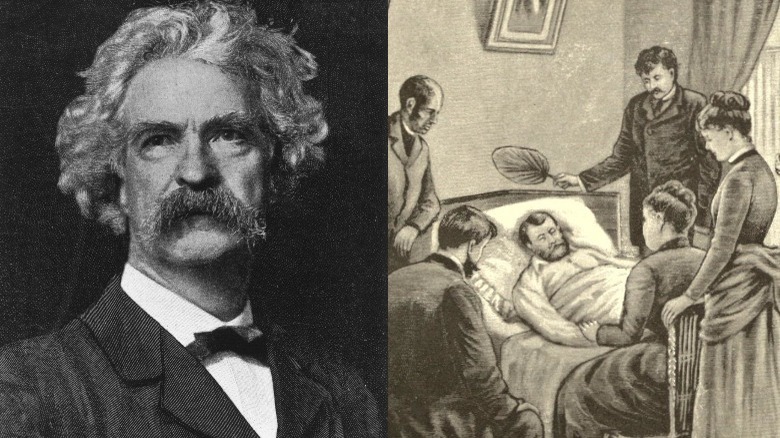The Tragic 1885 Death Of Ulysses S. Grant
Even in the 19th century, it's hard to imagine a former United States president dying with less than $200 to his name — especially when he was also one of the most revered military leaders in the nation's history — but that is precisely what happened to Ulysses S. Grant. Grant died on July 23, 1885 and had been in financial ruin at the time, after his son got him tied up in a Ponzi scheme, according to CBS News.
While Grant was broke, this threatened his family's financial well-being after his death. Fortunately for the Grant family, there was a way out of the financial bind: Grant needed to write a memoir. The former president had been unwilling to commit to writing his life story, but when one of the nation's most respected authors, Mark Twain, offered him $50,000 upfront, plus 75% of the book's revenue, it was an offer Grant simply couldn't turn down. However, Grant was in poor health, and so began the race to finish his memoir and save his family's financial future before he succumbed to throat cancer.
Grant's early life
Given that Grant is remembered as being a Union general whose service during the Civil War led directly to him being elected president, it's easy to assume that he came from a military family or had a smooth career, rising through the military's ranks, but that wasn't the case. According to PBS, Grant's father, Jesse Grant, grew up in poverty but managed to acquire two handy skills: farming and tanning, or the process of making leather. The elder Grant decided to pursue tanning leather as a business and wound up finding success in the industry.
In that era, it was especially common for sons to take over their father's business. However, Jesse Grant's son, Ulysses, wasn't interested in getting into the leather tanning business, so he enrolled at the U.S. military academy at West Point in 1839. According to History, Ulysses S. Grant later admitted that he didn't have much interest in the military, either, but had originally liked the idea of becoming better on horseback. Upon graduating, Grant was thrown into the Mexican-American War, yet another thing he had no interest in — only this time it was for moral reasons — and once the war was over he served along the west coast in both Oregon and California.
Grant's resignation from — and return to — the Army
According to History, In the years after leaving West Point, Grant spent a lot of time away from his wife and kids. He was extremely lonely, and to combat that, he turned to alcohol. His superiors started to notice the toll his alcohol abuse was taking on him, and in 1854 they asked him to resign from the Army. He settled in Missouri where he managed to overcome his alcoholism and tried to make a life for himself in farming and land speculation, but things weren't taking off, so he wound up working at the very place he had tried to avoid in the first place: his father's tanning business. Grant worked as a clerk at the tannery, but the Civil War changed the trajectory of both Grant's life and the history of the United States.
Grant re-enlisted in 1861 and was appointed by the Governor of Illinois to lead a volunteer regiment, according to the White House. Grant quickly saw success with a series of victories and brazen attacks on Confederate forts. During one such attack, a Confederate commander asked to discuss the conditions of his and his men's surrender, to which Grant replied, "No terms except an unconditional and immediate surrender can be accepted."
President Lincoln soon named him major general of all Union volunteers, but he had returned to his drinking ways and picked up another bad habit. Grant had started smoking copious numbers of cigars, something perhaps exacerbated when he received more than 10,000 boxes of cigars from thankful citizens during the war.
After the Civil War and presidency
Grant was integral in Union forces winning the Civil War, something President Lincoln realized during the war. He gave Grant the rank of lieutenant general, which had only ever been given to George Washington. Grant was the man Confederate General Robert E. Lee surrendered to at Appomattox Court House, officially ending the war, per the White House.
By the end of the 1960s, Grant's place as a bona fide American hero was secured, and in the 1868 U.S. presidential election, he defeated Democratic challenger Horatio Seymour to become the 18th President of the United States. Once in office, Grant fought (unsuccessfully) against rampant corruption and oversaw the reconstruction of the American south (via History). He managed to pass legislation that limited the political influence the Ku Klux Klan had during the reconstruction period and signed the 1875 Civil Rights Act, which aimed to desegregate many public places. He also helped rebuild the United States' relationship with the British, as it had taken a hit when the latter offered to help supply the Confederate Army. After serving his second term, Grant retired from office and traveled through Europe for a few years alongside his wife, Julia.
Grant's financial woes
In 1880, Grant had invested in a banking firm. According to the National Museum of American History, this firm was run by a man named Ferdinand Ward. Ward was not an exemplary character, but he made his business look legitimate by bringing a notable person into the fold for the sake of optics. In this case, he chose Grant's oldest son, Buck. The former president invested his life savings in the bank. Four years later, upon learning that his son's firm was having financial issues, he took out a loan for $150,000 from William Vanderbilt to save the business. Vanderbilt was the world's richest man at the time and saw major problems with giving Grant the loan, but Grant was still a highly respected individual at the time, so he did it anyway.
Soon, the money was gone. Grant had to repay Vanderbilt with Civil War memorabilia and items he and his wife had collected in Europe. Vanderbilt eventually returned these items to Julia Grant after her husband's death, but stipulated that they be donated to the National Museum.
Grant's memoir saved his family
Grant had received several offers in his lifetime to write a memoir, but he had always turned them down. However, when Mark Twain — another famous American who was a great admirer of Grant — offered a deal to write a book, Grant couldn't turn it down. According to CBS News, Grant made his way to his cottage in upstate New York to write. He needed a place where he could focus, because by this point he was already suffering from throat cancer and was in a race against his own mortality to finish the book.
To deal with some of the pain he was feeling, Grant would take swigs of "cocaine water," which is exactly what it sounds like. At a certain point, he was in too much pain to speak and had to write notes to communicate. Grant worked feverishly and managed to churn out a 600-page book shortly before his death. "Personal Memoirs of U.S. Grant" was published and became a best-seller, which ended up making his family $400,000 and saving them from further financial issues. (You can read it online at Project Gutenberg.)
